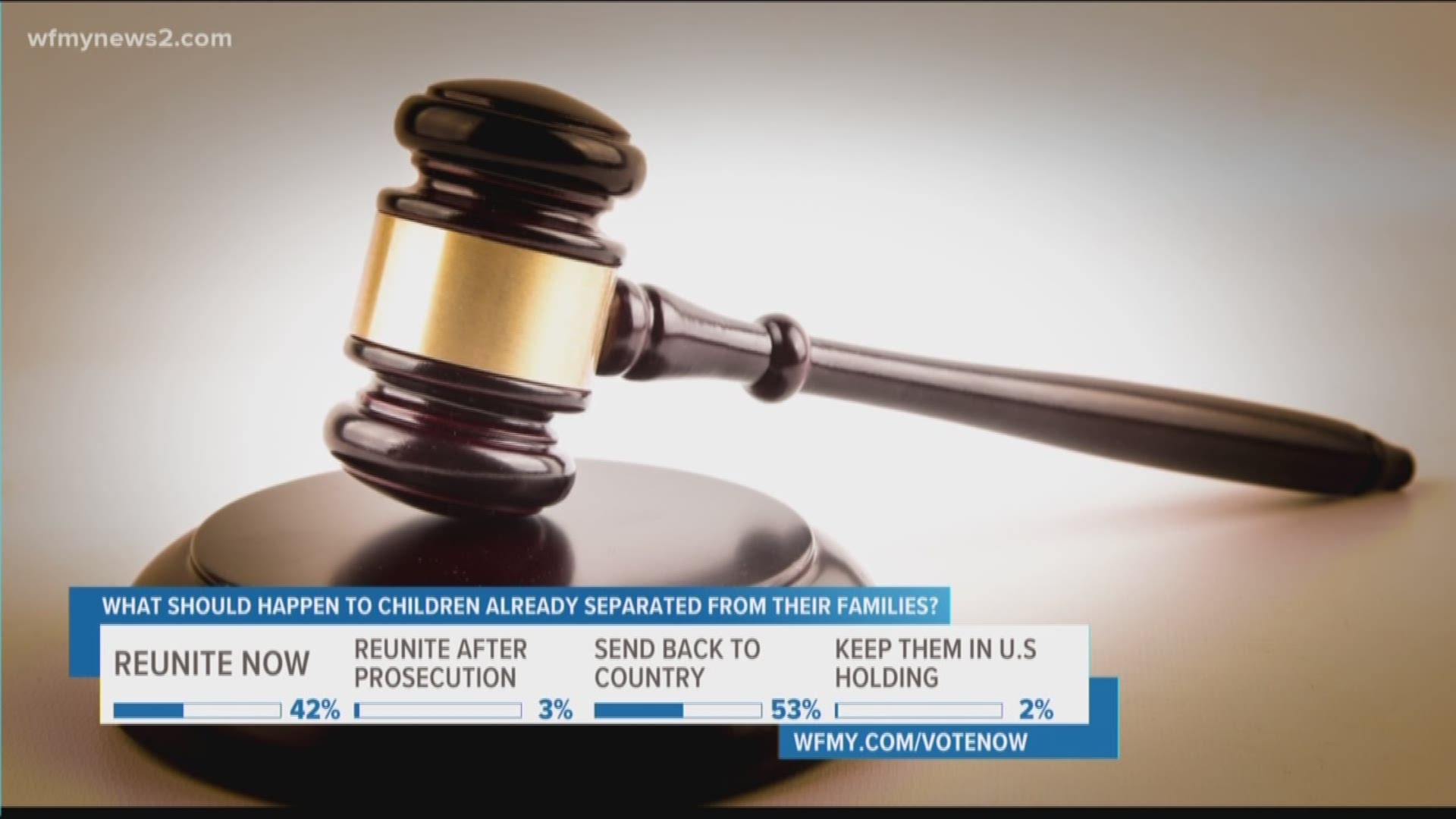The clock is ticking and pressure right now is on Congress to put forth legislation that will address not only children being separated but border security and immigration policy overall.
House Representatives were supposed to table two rival bills Thursday, and one has already been shot down.
The Securing America's Future Act, also known as the Goodlatte bill, made cuts to legal immigration, gave funding for a border wall and gave DACA recipients the option of renewable legal status, among other measures. That bill did not pass in Thursday's vote. One of the co-sponsors was North Carolina Representative Mark Walker who gave this statement:
"I co-sponsored this legislation because I believe it would go a long way to solve decades of unfair and unlawful actions that have plagued our immigration system, while prioritizing the safety of North Carolina families. It was disheartening to see not a single Democrat vote to give a permanent solution to DACA recipients, while implementing national E-Verify, strengthening our border, defunding dangerous sanctuary cities, preventing family separations under Department of Homeland Security custody and moving to a merit-based immigration system – all measures supported by a majority of the American people. It is possible to be both compassionate and just, while adhering to the rule of law and securing our border to prevent unlawful human trafficking, drug smuggling and foreign threats."
The bill was not expected to pass because Democrats and even some moderate Republican lawmakers have been opposed to some of the bill's measures. That's the worry with the other proposed bill, which will now be voted on Friday.
The compromise bill, as it's been called, offers DREAMers a path ot citizenship, border wall funding and several other measures, but it's caused some tension among House Republicans.
North Carolina Representative Mark Meadows accused house GOP leaders of leaving out some key parts of the compromise that lawmakers had previously agreed to, but didn't specify what those were. House Representatives are scheduled to vote on that bill Friday.
The bulk of this legislation was in the works before President Donald Trump signed an Executive Order Wednesday mandating children no longer be separated from their parents, at least temporarily. The Order calls on Congress to come up with a permanent solution and they have about 20 days to do it.
Under the Order, immigrant children would be allowed to stay with their families in detention. But a longtime U.S. Supreme Court ruling, known as the Flores decision, doesn't permit longterm detention of children in the U.S. Typically the wait time would is 20 days, which is where that deadline for Congress comes from. But part of what the Order does is instruct Attorney General Jeff Sessions to file a request with the California court that handled the Flores case to modify the Settlement Agreement to allow children to stay with their parents during the duration of their parents' criminal or immigration proceedings so long as it is in the best interest of the child. It also calls on Sessions to prioritize immigration cases.
Greensboro immigration attorney Jeremy McKinney says a fix is not that simple.
"The Flores decision is not some loophole that allows children to remain in the United States," he explains. "It simply says that we can't detain children for long periods of time unless it is in the best interest of that child based on his or her individual circumstances."
McKinney says all of these cases are situational, so trying to apply a blanket fix could just create more problems. He thinks the root of reform also lies in the method of holding immigrants accountable, saying he thinks mass detention is a waste of taxpayer dollars.
"That is a problem," McKinney says. "It is a concern of this administration. It is a concern amongst a lot of us that people are given court dates and then don't appear for court."
What McKinney thinks might work better are some practices that are already in use in North Carolina. Rather than detaining families, he would rather see supervision through officers or ankle monitors or even bond incentives.
Gerry Chapman, another Greensboro immigration attorney, also weighed in.
"You're just trying to figure out how do we take care of this child, even though the child is going to be in the deportation system and do that in a way that's sensible and also at least gives us a high probability the child will be able to return to court when that's appropriate," he explains.
Chapman says he wants to see a reform in work visas, which would allow immigrants to legally work in the United States taking open jobs other Americans can't or won't do.
"It will solve the problem," Chapman asserts.
I asked both Chapman and McKinney if, prior to the Executive Order, it was legal to take a child away from their parents at the border. They both say they felt it infringed on the child's rights. Technically, the parent is committing a crime by crossing the border illegally, but they note it's a low level misdemeanor and kids shouldn't have to pay the price.
The Executive Order does not detail what happens to the more than 2,300 children that have already been separated from their parents. It could be on Congress to come up with what happens to those kids.

